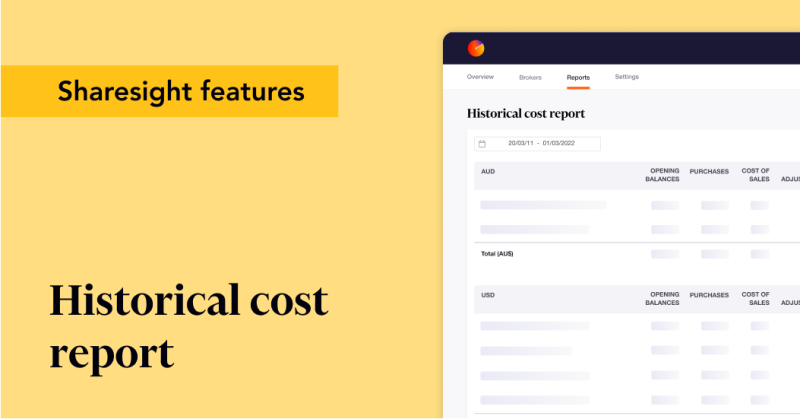The case for investing in Asia: Sharesight event wrap-up
The below article is for informational purposes only and does not constitute a product recommendation, or taxation or financial advice and should not be relied upon as such. Please check with your adviser or accountant to obtain the correct advice for your situation.
Is there a case for investing in Asia? The answers were revealed during an event hosted by Sharesight in association with Aberdeen Standard Investments last night in Sydney.
At the event, Sharesight CEO Doug Morris discussed the role geography plays in market diversification and Aberdeen’s Head of Investment Specialists (Asia) Don Amstad made the case for Asia as a geographic diversification play.
Attendees gained an understanding of the importance of asset allocation choices in an investment portfolio and the role historic events and culture have played to shape Asian economies, and the opportunities this presents for investors in the region.

Key takeaways
Asset allocation and market exposure to geographic diversification
Doug’s talk centred on the need for investors to look outside their home markets for opportunities, with real world data on the exposure of Sharesight user portfolios to exchanges outside their home markets.
Investment return thinking has evolved over time:
-
1986: "90% of investment return is determined by asset allocation" (Brinson, Singer, Beebower)
-
2010: "80% of return variation is determined by market movement... and active management has about the same impact on performance as a specific asset allocation policy" (Ibbotson)
Investors (in Australia) using Sharesight are increasingly diversified geographically:
-
2008 - 94% of on investment holdings are ASX listed vs International
-
2018 - 81% of investment holdings are ASX listed vs international
Where revenue is earned by listed companies varies significantly by exchange in the major market indexes:
-
Companies in France’s CAC 40, Germany’s FSE DAX and UK’s’ FTSE 100 give local investors the most exposure to revenue earned in international markets
-
Australia’s ASX 200 and the USA’s S&P 500 are not geographically diverse by comparison
-
In particular, overseas revenue earned by ASX 200 listed companies is mostly attributable to the 39 resource companies in the index - which carries sector concentration risk

The case for asia & the opening of China’s capital markets
Don has been giving versions of this talk for a decade.. And believes it is now more true than ever.
Economic and population growth:
-
Urbanisation is the key driver behind returns in China and across Asia
-
Life expectancy is up significantly across Asia, with the biggest shift being China, with life expectancy more than doubling from 36 in 1960 to 76 years today
-
Alongside this has been significant growth in GDP per capita, most concentrated in the big cities
-
Which has ballooned the size of the middle class and an increasing culture of consumerism
China’s demographic problem:
-
As the population ages, there is forecast to be a halving of the number of workers per retiree by 2050
-
Government lead focus on the quality of work / productivity to support this
-
This means there will be a shift in the savings pool from purely investing in growth to smarter asset allocation
-
While it is rapidly evolving, China doesn’t have the same credit/equity investing culture of other markets
-
China is attempting to ‘import’ the investing culture from other markets by opening up Chinese stock/bond markets to investors worldwide
-
This could be a massive opportunity for investors to find underpriced stocks before they reach ‘fair’ value
Chinese market inclusion in major indexes:
-
Included in SDR in 2016
-
MSCI began to include A shares in May 2018
-
Bloomberg / Barclays indices moved to include China this year
-
More are expected to follow...
With the inclusion of China in these world indexes, other markets need to be down weighted - which means investors exposed to those markets may see capital flowing out.

Q&A Session
The audience raised two very good questions, answers below:
What about corporate governance issues?
Don Amstad:
"In the Asia Pacific, Australia, Singapore and Hong Kong have excellent but declining corp governance. China by comparison is quite poor, but it’s getting better fast. Tread carefully and do your due diligence - independent investigation of company governance is sometimes needed.“
What impact will the US/China trade war have?
Don Amstad:
"It’s not just a trade war, it’s far more than that, it’s about the rise of China and the desire now of the current American administration to want to stop the rise of China and I think they are going to be very frustrated by that.
One of the big problems of the trade war is the reporting of it in the press is quite poor. The american position is well publicised, but the Chinese position is very poorly covered.
Trump is upset at the US run such a large deficit with China, while it’s a factually correct position, more broadly it’s a counterproductive position to hold.
However the relationship is much more balanced than Trump will ever acknowledge, and China’s ability to counter the USA’s moves is actually much greater than they are given credit for. Trump is finally waking up to who have been receiving the real benefits from this situation and has reversed some of his decisions.
The other reality is the political cycle, Trump needs to be reelected in 18 months, whereas Xi is potentially leader for life.
For China, what’s the point in striking a trade deal with Trump? He’s the kind of leader that can’t be trusted, who could wake up one day and turn his back on the deal.
Trump positions himself as the master negotiator, I don’t think he’s come across anyone as organised and smart as the Chinese communist party - they’re wrong it they think it’s as disorganised as the US Democratic Party."
Thanks to everyone who participated in, and attended the event. We look forward to hosting more in the very near future, so stay tuned to our Facebook and Twitter feeds for more info!
International investors love Sharesight
Sharesight was built for the needs of international investors like you, and makes it easy to keep track of your portfolio. Here’s how:
- Automatically track your daily price & currency fluctuations, and handle corporate actions such as share splits.
- See upcoming dividend payments with the Future Income Report.
- Calculate your dividend income with the Taxable Income Report.
- Get the full picture of your investment performance, including the impact of brokerage fees, dividends, and capital gains with Sharesight’s annualised performance calculation methodology.
FURTHER READING

Sharesight nominated for 2025 Wealth Tech Innovator of the Year
Sharesight has been chosen as a finalist in the 2025 Australian Wealth Management Awards, in the Wealth Tech Innovator of the Year category.

Prepare your annual accounts with our historical cost report
Sharesight's historical cost report is a powerful tool for investors who need to prepare annual accounts or financial statements with mark-to-market accounting.

Sharesight product updates – July 2025
This month's focus was on rolling out predictive income forecasting, as well as improved cash account syncing across different brokers and currencies.